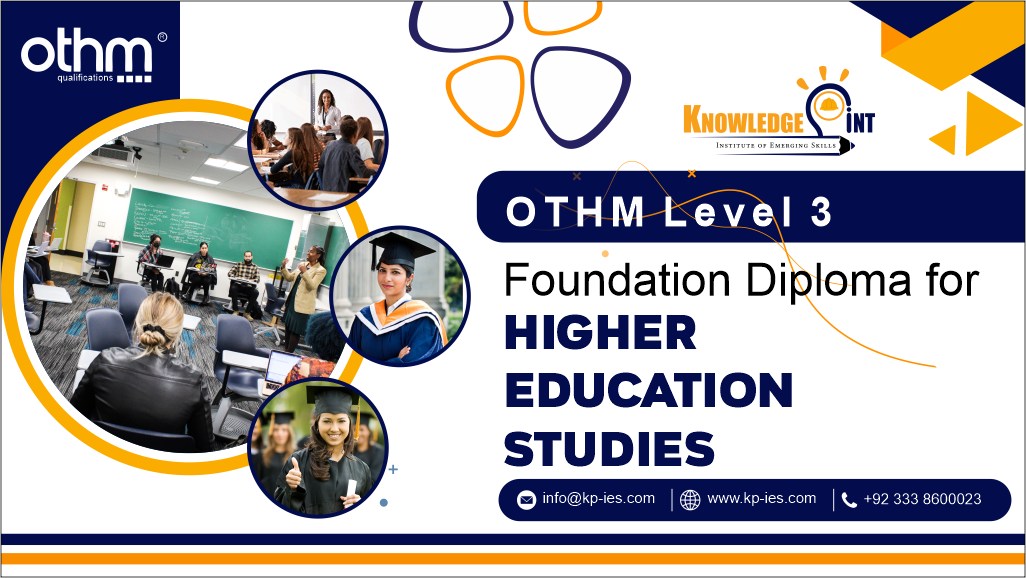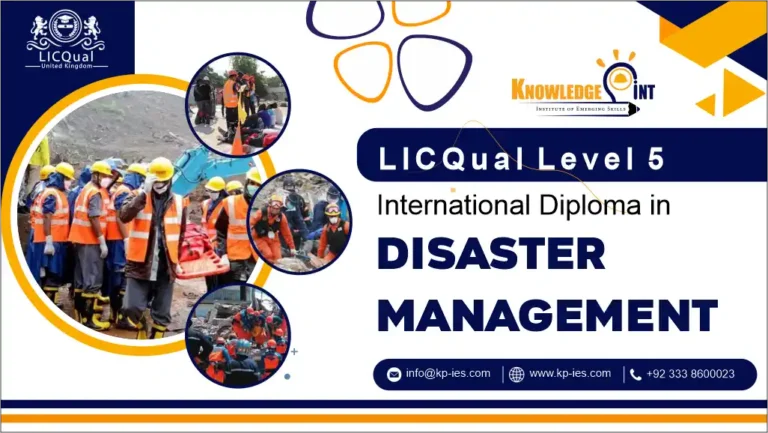In today’s competitive world, the path to higher education can be both challenging and rewarding. For those looking to bridge the gap between secondary education and university-level studies, the OTHM Level 3 Foundation Diploma for Higher Education Studies offers an excellent stepping stone. This diploma provides a comprehensive introduction to the skills and knowledge required for academic success at the university level.
The OTHM Level 3 Foundation Diploma for Higher Education Studies is designed to prepare students for further academic study at the undergraduate level. This qualification is particularly beneficial for those who may not meet the traditional entry requirements for university but still aspire to pursue higher education. The diploma covers a range of subjects, equipping students with the foundational skills needed to thrive in a university environment.
The OTHM Level 3 Foundation Diploma for Higher Education Studies is a valuable qualification for those seeking to embark on their journey into higher education. By providing essential academic skills and subject knowledge, this diploma opens doors to further study and a range of career opportunities. Whether you’re a school leaver, a mature learner, or an international student, this diploma offers a structured and supportive pathway to achieving your academic and professional goals.
Course Overview
The OTHM Level 3 Foundation Diploma for Higher Education Studies consists of 6 mandatory units which are as follows.
The OTHM Level 3 Foundation Diploma for Higher Education Studies is designed to equip students with the essential skills and knowledge required for successful academic progression. Here are the key learning outcomes for each module:
Academic English and Study Skills
- Effective Communication: Develop the ability to communicate clearly and effectively in written and spoken English within an academic context.
- Academic Writing: Learn to produce well-structured, coherent essays and reports, using appropriate academic conventions.
- Critical Reading and Analysis: Enhance skills in critical reading and analysis of academic texts, identifying key arguments and evaluating evidence.
- Study Techniques: Master various study techniques, including note-taking, summarizing, and paraphrasing, to support academic success.
2. Introduction to Business
- Business Concepts: Understand fundamental business concepts, including marketing, management, finance, and operations.
- Business Environment: Analyze the external factors that impact businesses, such as economic, social, technological, and legal influences.
- Organizational Structures: Learn about different types of organizational structures and their impact on business operations.
- Business Communication: Develop effective business communication skills, both written and oral, for various business contexts.
3. Introduction to Social Sciences
- Foundational Theories: Gain an understanding of key theories and concepts in sociology, psychology, and other social sciences.
- Research Methods: Learn basic research methods used in social sciences, including qualitative and quantitative approaches.
- Human Behavior: Explore factors influencing human behavior and social interactions, such as culture, identity, and socialization.
- Critical Thinking: Develop critical thinking skills to analyze social issues and evaluate different perspectives.
4. Introduction to IT
- IT Fundamentals: Acquire basic knowledge of information technology, including hardware, software, and networks.
- Office Applications: Learn to use essential office applications, such as word processing, spreadsheets, and presentation software.
- Data Management: Understand principles of data management and security, including data storage, retrieval, and protection.
- Digital Literacy: Enhance digital literacy skills necessary for academic and professional environments, including online research and communication.
5. Study Skills for Higher Education
- Time Management: Develop effective time management skills to balance academic workload and personal responsibilities.
- Research Skills: Learn to conduct academic research using various sources, including libraries and online databases.
- Critical Thinking and Problem-Solving: Enhance critical thinking and problem-solving skills applicable to academic and real-world scenarios.
- Presentation Skills: Develop confident and effective presentation skills for academic and professional settings.
Overall Program Outcomes
- Academic Preparedness: Equip students with the academic skills and knowledge required for successful progression to higher education.
- Self-Directed Learning: Foster the ability to engage in self-directed learning and independent study.
- Confidence and Adaptability: Build confidence and adaptability in students, enabling them to navigate the challenges of higher education and beyond.
- Interdisciplinary Understanding: Provide an interdisciplinary understanding that bridges various fields of study, preparing students for diverse academic pathways.
Course Benefits of the OTHM Level 3 Foundation Diploma for Higher Education Studies :
1. Specialized Expertise
- Auditing Proficiency: Gain specialized knowledge and skills in auditing energy management systems according to the ISO 50001:2018 standard.
- Industry Recognition: Earn a globally recognized qualification that demonstrates your proficiency as an energy management systems auditor.
2. Career Advancement
- Expanded Career Opportunities: Qualify for roles such as Lead Energy Auditor, Energy Management Consultant, or Compliance Officer.
- Higher Earning Potential: Enhance your value to employers and increase your earning potential with specialized expertise in energy management auditing.
3. Industry-Relevant Skills
- Practical Application: Acquire practical skills and techniques for planning, conducting, and documenting energy management system audits.
- Effective Communication: Develop communication skills to interact with auditees, audit teams, and stakeholders effectively.
4. Contribution to Sustainability
- Promotion of Energy Efficiency: Play a key role in promoting energy efficiency and reducing environmental impact within organizations.
- Support for Sustainable Practices: Assist organizations in implementing and maintaining energy management systems that support sustainability goals.
5. Quality Assurance
- Compliance Assurance: Help organizations achieve compliance with ISO 50001:2018 requirements and other relevant regulatory standards.
- Risk Mitigation: Identify areas of non-conformance and provide recommendations for corrective actions to mitigate risks.
6. Continuous Professional Development
- Lifelong Learning: Engage in continuous professional development by staying updated with the latest developments and trends in energy management auditing.
- Networking Opportunities: Connect with industry professionals, auditors, and experts, expanding your professional network and opportunities.
7. Organizational Benefits
- Improved Performance: Contribute to the improvement of organizational energy performance through effective auditing and recommendations for continuous improvement.
- Enhanced Reputation: Help organizations build a positive reputation for their commitment to energy management and sustainability practices.
8. Personal Growth
- Leadership Development: Develop leadership skills to effectively manage audit teams, delegate tasks, and ensure audit objectives are met.
- Confidence Boost: Gain confidence in your abilities as an energy management systems auditor through practical training and hands-on experience.
The OTHM Level 3 Foundation Diploma for Higher Education Studies serves as a stepping stone towards various academic and professional pathways. Upon completing this diploma, students have several options for future progression, enabling them to advance their education and career prospects.
Further Education and Higher Qualifications
Level 4 Qualifications:
- OTHM Level 4 Diploma in Business Management: This course builds on the foundational knowledge acquired at Level 3, offering deeper insights into business management principles, including strategic management, marketing, and finance.
- OTHM Level 4 Diploma in Health and Social Care Management: Ideal for those interested in the healthcare sector, this diploma covers topics such as health promotion, social care management, and policy development.
- OTHM Level 4 Diploma in Information Technology: This qualification provides advanced knowledge and skills in IT, preparing students for technical and managerial roles in the tech industry.
Undergraduate Degrees:
- Bachelor’s Degree in Business Administration (BBA): Many universities accept the Level 3 diploma as an entry qualification for a BBA, offering comprehensive studies in business management, marketing, and finance.
- Bachelor’s Degree in Social Sciences: This degree allows students to specialize in fields such as sociology, psychology, or political science, providing a deeper understanding of social dynamics and human behavior.
- Bachelor’s Degree in Information Technology: For those interested in a tech career, this degree offers in-depth knowledge of software development, networking, and cybersecurity.
2. Professional Certifications
Project Management Certifications:
- PRINCE2 Foundation: This certification provides knowledge in project management methodologies, making it beneficial for those aiming to manage projects effectively within various organizational settings.
- Certified Associate in Project Management (CAPM): Offered by PMI, this certification is ideal for those starting a career in project management, providing foundational knowledge and skills.
Human Resources Certifications:
- CIPD Level 3 Foundation Certificate in People Practice: This certification enhances HR knowledge and skills, offering practical insights into people management and HR operations.
3. Career Advancement Opportunities
Entry-Level Roles:
- Administrative Assistant: Graduates can start their careers as administrative assistants, applying their knowledge of office applications and organizational skills.
- Customer Service Representative: Utilizing their communication and problem-solving skills, graduates can excel in customer service roles, addressing customer inquiries and resolving issues.
Mid-Level Roles:
- Business Analyst: With further experience and possibly additional qualifications, graduates can move into business analyst roles, where they analyze business processes and provide recommendations for improvement.
- HR Coordinator: Equipped with foundational HR knowledge, graduates can take on HR coordinator roles, supporting various HR functions such as recruitment, training, and employee relations.
4. Specialized Fields and Roles
Marketing and Communications:
- Marketing Assistant: Graduates can pursue roles in marketing, supporting campaigns, market research, and digital marketing activities.
- Public Relations Officer: Using their communication skills, graduates can manage public relations efforts, including media relations and event planning.
Information Technology:
- IT Support Technician: For those with an interest in IT, starting as an IT support technician provides hands-on experience in troubleshooting and maintaining computer systems.
- Junior Software Developer: With additional training, graduates can begin careers as junior software developers, working on coding and software development projects.
5. Continuous Learning and Professional Growth
Workshops and Seminars:
- Attending industry-specific workshops and seminars helps keep professionals updated on the latest trends, technologies, and best practices in their field of interest.
Networking and Professional Associations:
- Joining professional associations such as the Chartered Management Institute (CMI) or the Society for Human Resource Management (SHRM) provides opportunities for networking, professional development, and staying informed about industry standards.
The OTHM Level 3 Foundation Diploma for Higher Education Studies opens numerous doors for academic and professional growth. Whether aiming to advance through higher education, gain specialized certifications, or progress in a career, this diploma equips learners with essential knowledge and skills for success. By pursuing further qualifications, engaging in continuous learning, and seeking new career opportunities, graduates can confidently navigate their professional journeys and achieve their goals.







